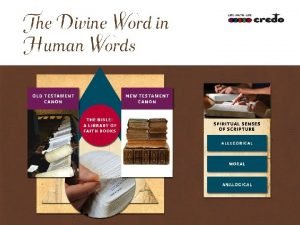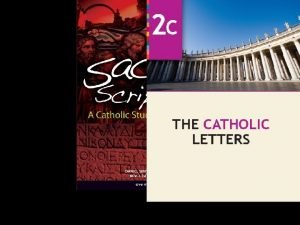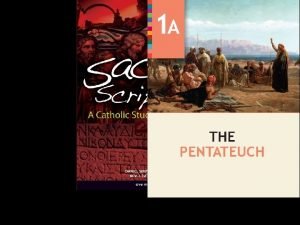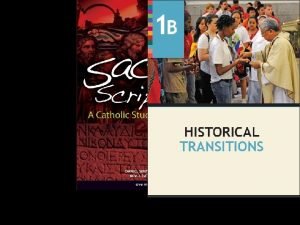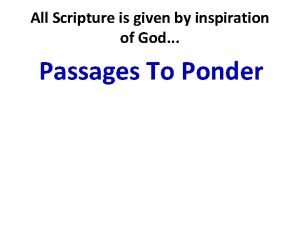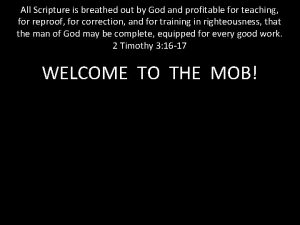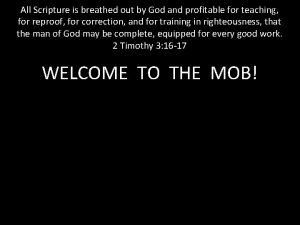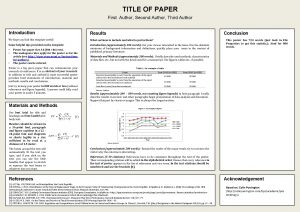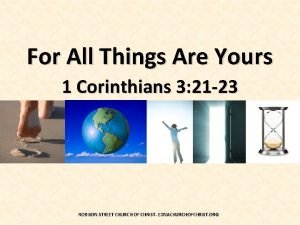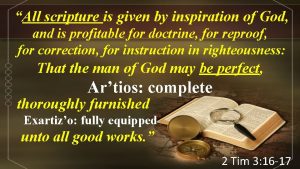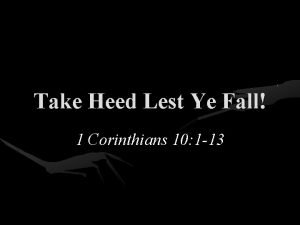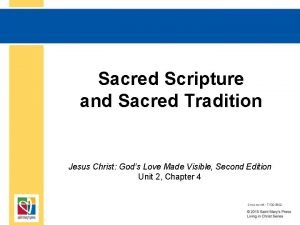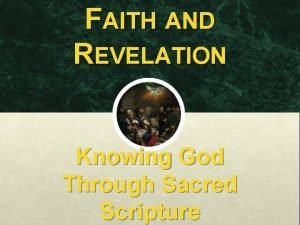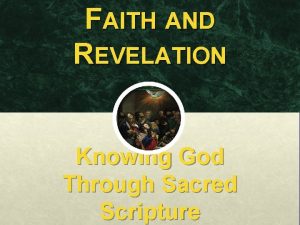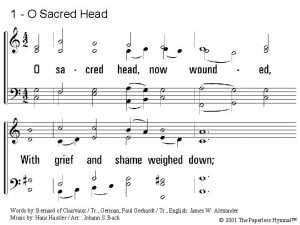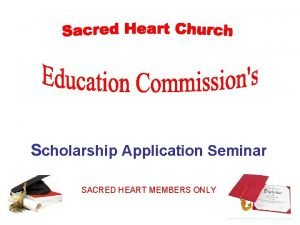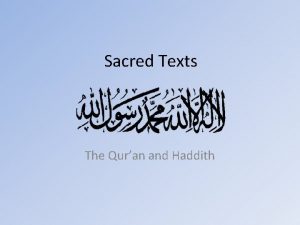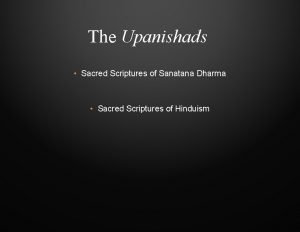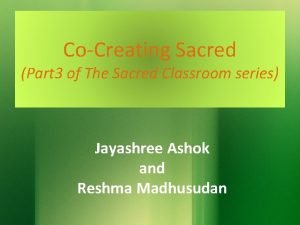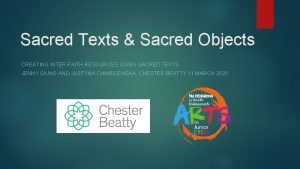God is the Author of Sacred Scripture All
















- Slides: 16


God is the Author of Sacred Scripture ‘All Scripture is inspired by God’ (2 Timothy 3: 16). The writings in the Old and New Testaments are God’s Word to us. Divine Inspiration ‘is the divine assistance given to the human authors of the books of Sacred Scripture. Guided by the Holy Spirit, the human authors made full use of their talents and abilities while, at the same time, writing the truth that God intended (USCCA, 516). The Sacred Scriptures reveal the truth of who God is, of who we are and of how we are to live as people created in the divine image and likeness. (GN 1: 27) They teach how we are to live each day. (Ps 119, 120) They provide direction for eternal life. (RM 6: 23, JN 20: 30 -31)

Word of God in Human Language The worlds of the Old and New Testaments in which the Sacred writers lived and wrote were very different from our own. We need to know about their culture and customs, politics and religious practices in order to understand what the inspired Sacred writers intended to communicate in their writing. The Sacred writers wrote using literary genres, or forms of writing known to them and to the people for whom they were writing. Understanding them helps us understand the truth God intended to communicate. Name some examples (p. 32) ___________ ‘The fact is that truth is differently presented and expressed in the various types of historical writing, in prophetical and poetical texts, and in other forms of literary expression’ (Vatican Council II, Constitution on Divine Revelation, 12).

A Library of Faith Books Unlike most modern books written by a single author over a short period of time, most of the books in the Bible, especially in the Old Testament were the work of many inspired authors, over a long period of time from more than one place. The process of writing the Old Testament spanned one thousand years The New Testament writing process took around 100 years. Canon of Scripture are the writings that the Catholic Church has judged to be inspired by God and that accurately pass on Divine Revelation Christianity’s Roots are in Judaism…the Catholic Church accepts the sacred writings of the people of Israel as her own *** Look up the origin of the word ‘Bible” (p. 33)

The Old Testament in the Bible The teaching of the Council of Trent (1563) reaffirmed the canon (Septuagint) recognized by the Church at various Councils and Synods The Catholic Church lists forty-six books in the Old Testament Four major sections: The Pentateuch The Historical Books The Wisdom Books The Prophetic Books The books that are not part of the official Protestant or Jewish canon are called the deuterocanonical (literally ‘second canon’) books. The Dead Sea Scrolls, as well as the targums and other authentic ancient texts, are extremely important for scholars who wish to study the early versions of the Old Testament. (Read p. 35)

The New Testament Canon The New Testament contains twenty-seven books, or writings. These include: (1) the four written accounts of the Gospel; (2) Acts of the Apostles; (3) Letters, or Epistles; and (4) Book of Revelation. The New Testament was written during the last half of the first century AD and the early part of the second century. Jesus taught by the spoken word and in the early Church, the Apostles’ remembered accounts were important. Beginning around the year 65 AD, Matthew, Mark, Luke, John and their disciples began writing their memories of Jesus’ life, ministry and preaching. Over the next three decades, the four accounts of the Gospel as well as the Acts of the Apostles, other letters in the New Testament attributed to St. Paul but written by his disciples, and the book of Revelation (Apocalypse) came to be written. By the year 150 AD most of the listed books that we have today were in place and agreed upon as canonical.

Do Now!! Need Bible and Loose leaf Use your Bible to locate your favorite Bible passage from either the Old Testament or New Testament 1. Write out the Scripture verse and it’s notation 2. Reread your passage slowly at least 2 x’s 3. What is the truth or spiritual wisdom the passage offers you or others? How might you take the teachings of the passage to heart and make them part of your own life? Write your thoughts down and turn in.

Interpreting the Scriptures ‘Interpretation of the inspired Scripture must be attentive above all to what God wants to reveal through the Sacred authors for salvation. What comes from the Spirit is not fully “understood except by the Spirit’s action”’ (CCC, no. 137). God works through the Church and her Magisterium, guiding her to interpret the Scriptures authentically. The Church has established wise guidelines giving us reliable interpretation for our lives: 1. Read Scripture within Tradition and the teachings of the Church. 2. Know and keep in mind the history and culture of the time in which the book was written. (Analogy of Faith) 3. Read each part of the Scriptures in light of the overall teaching of the whole of Scripture.

Interpreting Scripture 4. Read Scripture for its spiritual wisdom and witness to faith 5. Expect to learn Scripture’s spiritual wisdom, deliberately search out the truths and meaning you can bring into your own life. Moving Beyond a Literalist Meaning The Catholic Church teaches that we move beyond Biblical fundamentalism (understanding Biblical text only at its most obvious and literal level of meaning) to get to the faith truths or layers of meaning buried beneath the literal meaning of the words.

Faith Truths of Creation 1. God created the world and everything in it 2. God created human beings in the divine image and likeness 3. God the Creator has given humanity the responsibility to steward creation 4. God the Creator has placed order within creation 5. God sustains the world in existence 6. God blessed the seventh day, made it holy and rested (GN 1: 1 -2: 4)

God’s Word in Life of the Church FOUR ways in which Sacred Scripture enriches the prayer of the Church: 1. The Lord’s Prayer (AKA______________) The disciples asked Jesus, ‘Lord, teach us to pray’ (LK 11: 1) St Thomas Aquinas taught that it is ‘the most perfect of all prayers’ 2. The Liturgy of the Word…readings for Mass are assigned for Liturgy throughout the liturgical year 3. The Liturgy of the Hours…the official daily prayer of the Church (AKA the Divine Office) is prayed at set times in the day 4. Lectio divina…’divine reading’ is a Traditional way of praying with the Word of God by reading, reflecting and acting on what they hear God saying to them.

Opening up the Deeper Meaning of the Scriptures The word ‘exegesis’ comes from a Greek word meaning both to ‘interpret’ and to ‘explain’. Exegesis is ‘the process used by Scripture scholars to determine the literal and spiritual meaning of the biblical text’ (USCCA, 512). Spiritual Sense of Scripture Is rooted in the unity of God’s plan of salvation and has 3 dimensions: 1. Allegorical anticipates something in the future in the life of Christ or the Church 2. Moral mandates us to live justly 3. Analogical refers to biblical events that are a sign of something eternal and beyond death

Faith—Our Response to God’s Word Sacred Scripture--the living Word of God in which we encounter God. Faith is necessary for salvation and it has a personal and communal dimension. It is a personal act and the free response of the human person to God. At the same time, it is a communal act which must be lived in company with other people of faith, the Church. The Creeds of the Church set forth the substance of the faith of the Church handed down from her beginning. The Apostles’ Creed and the Nicene Creed enable all Christians to express, celebrate and share the truths of faith through a common ‘profession of faith’.

St. Bonaventure was born in northern Italy in 1217 AD. His parents named him John, but St. Francis of Assisi renamed him Bonaventura, or ‘Good Fortune’, after he healed the infant John of a serious illness. He entered the Order of Friars Minor (Franciscans) and became a highly respected philosopher and theologian, lecturer and writer.

St. Bonaventure For Bonaventure, Christ alone is the one and only true Teacher and Master. “The purpose of the Scriptures, which come to us from God, is to lead us to this fullness according to the truths contained in those sayings of the Apostles… In order to achieve this we must study holy Scripture carefully, and teach it and listen to it the same way. ” (St. Bonaventure) Pope Sixtus IV named him a saint of the Church in 1482.

Reflect on the following Scripture passage and write at least 3 sentences on it’s meaning in your life or other human’s lives: The grass withers, the flower fades; but the word of our God will stand forever. (Isaiah 40: 8)
 Who is the author of sacred scripture
Who is the author of sacred scripture Sacred scripture a catholic study of god's word
Sacred scripture a catholic study of god's word Sacred scripture a catholic study of god's word
Sacred scripture a catholic study of god's word Sacred scripture a catholic study of god's word
Sacred scripture a catholic study of god's word Scripture inspired by god
Scripture inspired by god All scripture is given by inspiration of god
All scripture is given by inspiration of god All scripture is breathed out by god
All scripture is breathed out by god All scripture is breathed out by god
All scripture is breathed out by god Sacred scripture of daoism
Sacred scripture of daoism First author second author third author
First author second author third author All things are yours scripture
All things are yours scripture All scripture is given
All scripture is given All scripture is given
All scripture is given Name all the lines name all the segments name all the rays
Name all the lines name all the segments name all the rays Sinners in the hands of an angry god speech
Sinners in the hands of an angry god speech A wise man seeks counsel
A wise man seeks counsel Take heed lest ye fall
Take heed lest ye fall
